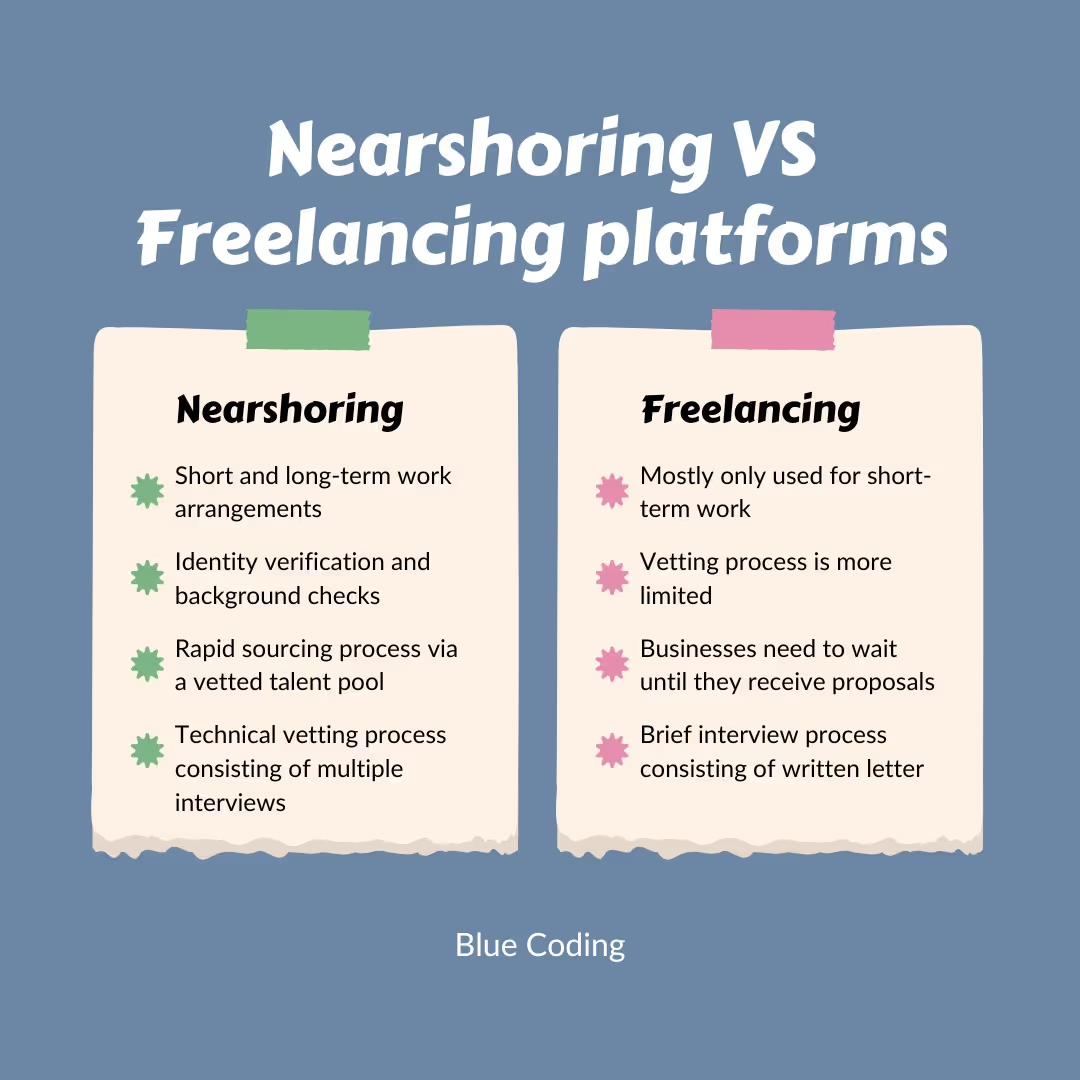There’s no denying the importance of a software developer’s work. Every company looking to have a professionally designed and highly customizable website or eCommerce store needs a developer to aid in building the site. Now, when you take into account that statistics have shown that in the U.S there are five jobs for every software developer available, it’s the industry is facing an IT talent shortage. This particular situation calls for new solutions and branching out regarding the ways your company is used to hiring developers, such as nearshoring or hiring freelancers. But what are the differences between nearshore outsourcing vs freelancing platforms? Keep reading to find out!
Nearshore outsourcing or nearshoring is an IT hiring strategy consisting of hiring a third-party agency to find remote developers to work for your company. These IT professionals are located in nearshore countries, meaning there won’t be significant time or cultural differences between your existing team and your outsourced developers. One of the most popular places to outsource nearshore developers from is actually Latin America, thanks to the large talent pool available, quality of local development work, and minimal time zone differences all across the continent.
Freelancing platforms are marketplace applications that connect freelance developers with companies looking to outsource their IT work. These sites usually host freelancers and remote workers from all industries, not just tech, who specialize in all sorts of skills. You can filter your preferences by region, language, tech stack, or particular work you need the freelancer to get done. More often than not, these professionals are only available for short-term work or particular projects. The two most popular freelancing platforms are Fiverr and Upwork.

The truth is, freelancing platforms just aren’t built with long-term, work arrangements in mind. On the contrary, the kind of projects that bloom on these marketplace apps is those with both very specific guidelines and timelines. You post a project, freelancers bid on it, the work is done, and both parties move on. Nearshoring, on the other hand, is targeted toward long-term development support. Your in-house staff will develop a working relationship with external, remote IT professionals and you can keep them on your team for as long as you need.
Believe it or not, background checks on freelancing platforms are pretty bleak at most. These consist of a quick identity verification when the freelancers first sign up and then are reinforced by the information they continue to update their profile with. There’s no dedicated professional vetting these developers nor someone who can refer their previous work. While this might seem like an irrelevant detail since it’s all remote work anyhow, there have been cases of coding candidates lying about their location to be considered nearshore workers when truly they lived offshore and had considerable time differences to US companies. Lucky for you, nearshoring agencies run extensive background checks on developers and mainly hire IT professionals from their already-established international networks
While nearshoring agencies work with a specific talent pool they have curated for years, freelancing platforms host developers of all regions and levels of expertise. You’ll need to dig a little deeper to find IT professionals that are the right fit for your company since the talent pool on these apps is much wider and scattered than the ones available through staffing agencies
When you’re dealing with a larger and less targeted talent pool, it can certainly take a while longer to find a good developer to add to your existing team. You’ll have to wait at least a few hours after posting about your project to hear from qualified candidates and then it can take days from there until you hire somebody to do the job. Even then, it might not be a good fit and you’ll have to go back to hunting for new candidates. With nearshore outsourcing agencies you’re hiring from an existing talent pool instead. This gives you immediate access to candidates and ensures you’ll interview them within days.
As we’ve mentioned, vetting processes on freelancing platforms leave a lot to be desired. The same happens with interviews, as these marketplace applications don’t facilitate video calls or technical interviews. The required interaction for you to hire someone starts and ends with your invitation to apply and their written proposal. This doesn’t give you a real chance to learn more about the person or to properly test their skills. On the contrary, nearshoring agencies usually have a multiple-step hiring process along with a technical interview to asses the candidate’s ability to perform the work required of them.
Now that you understand the key differences between nearshore outsourcing vs freelancing platforms, it’s time to consider which one it’s best for your business. In case you decide nearshore outsourcing will bring more benefits to your company, our team at Blue Coding is here to help. We have a large network of remote developers ready to start working for your company and provide you with the solutions you need. Contact us to learn more about our services!
Subscribe to our blog and get the latest articles, insights, and industry updates delivered straight to your inbox